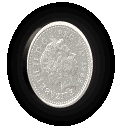
Many discussions of probability and independence begin with the consideration of coin flips. My plan for this page is to provide a collection of links that take the converstation a bit beyond conventional textbook discussions. One motivation comes from recent media discussions of coin spinning.
The introduction of the Euro, the largest currency switch in history, has proceeded with few problems - until now. Polish statisticians say the one Euro coin, at least in Belgium, does not have an equal chance of landing "heads" or "tails". They allege that, when spun on a smooth surface, the coin comes up heads more often. ... from the New Scientists " Spinning Belgian Euros."
When spun on edge 250 times, a Belgian one-euro coin came up heads 140 times and tails 110. "It looks very suspicious to me," said Barry Blight, a statistics lecturer at the London School of Economics. "If the coin were unbiased the chance of getting a result as extreme as that would be less than 7%." (The Guardian, January 4, 2002)
Once this news story hit the scene, and it wasn't long until others weighed in with their own analysis.
David MacKay gave a Bayesian analysis of the data using a beta prior for the probability of spinning a head.

More On Coin Flippling? Read about the investigations of Persi Diaconis and Joe Keller.